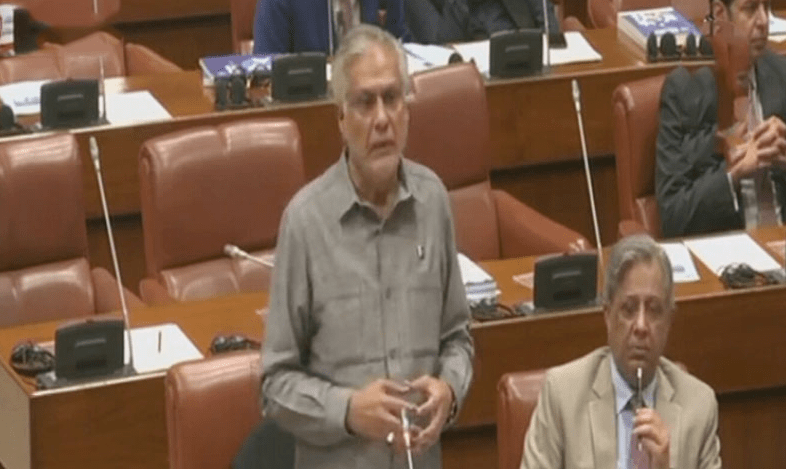
Foreign Minister Ishaq Dar on Thursday said that the ceasefire between India and Pakistan was extended until May 18, adding that the matter will “ultimately go to dialogue” between the civilian leadership of the two nations.
The military confrontation between India and Pakistan came as the former blamed Islamabad for the Pahalgam attack. On the night of May 6-7, New Delhi launched a series of air strikes on Pakistan, resulting in civilian casualties. Both sides then exchanged missiles, which stretched over the week. It took American intervention for both sides to finally drop their guns.
On Monday, the director general of military operations for both sides held the first round of talks via hotline after the ceasefire.
Speaking in the Senate today, FM Dar said that a military-to-military conversation took place between the two countries today, where they decided to extend the ceasefire until May 18.
“Ultimately, the matter will go to dialogue between the civilian leadership of the countries,” FM Dar said. “Right now, these are military-to-military communications.”
He said that a political dialogue would take place between the two countries and that a “resolution for all the problems will be discussed”.
“We have told the world that we will carry out a composite dialogue,” Dar said.
A day prior, Prime Minister Shehbaz Sharif invited India to a comprehensive dialogue to address all contentious issues, including the Kashmir dispute and the water distribution, between the two nuclear-armed neighbours.
According to the Associated Press of Pakistan (APP), Dar said that Pakistan did not request a ceasefire during the recent escalation with India.
Instead, it [ceasefire] was initiated following a call from the US Secretary of State, who conveyed that India was willing to halt hostilities, Dar said.
Dar emphasised that Pakistan had exercised restraint and communicated this to all friendly nations even before the outbreak of hostilities.
“We told our friends we would not initiate an attack, but we would certainly respond if provoked,” he said, adding that Pakistan’s response was measured, decisive, and in line with international norms.
Senate passes resolution paying tribute to armed forces
Separately, the Senate passed a resolution paying tribute to the armed forces for demonstrating “unwavering resolve, unparalleled Professionalism, and steadfast dedication in the successful execution of Operation Bunyan-um-Marsoos.”
The resolution, presented by Law Minister Azam Nazeer Tarar, said the operation was carried out with exceptional restraint and maturity, reflecting the conduct of a responsible nuclear state.
It congratulated the people of Pakistan for rising above all political, ethnic, and ideological divides and differences, demonstrating unity in support of national leadership across the political spectrum and speaking with one voice and one purpose to defend the people, sovereignty, territorial integrity, and dignity of the country.
It honoured the sacrifices of the valiant martyrs who laid down their lives in the defence of the sovereignty and national honour of the country.
It condemned “the brutal and unprovoked Indian attacks on innocent civilians, including women, children and mosques”.
It urged the government to proactively engage the international community for a peaceful, just and lasting resolution of the Indian-held Kashmir, stressing the critical importance of strict adherence to the Indus water treaty.





